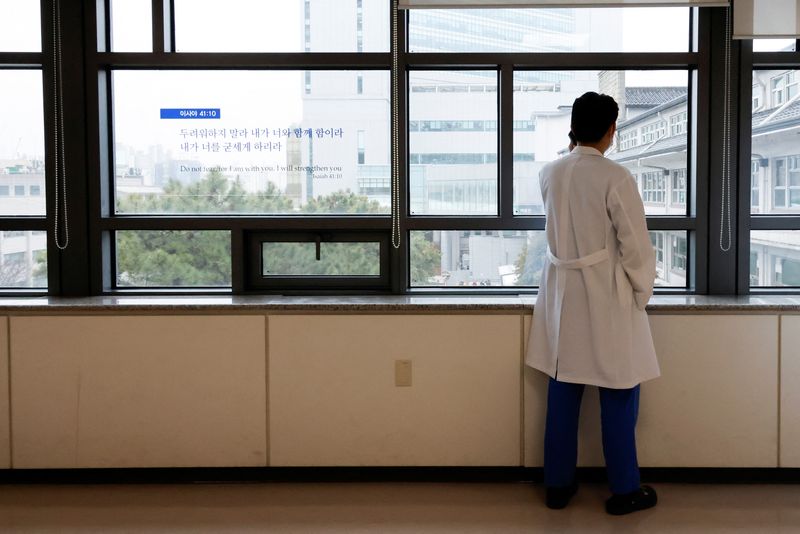By Joyce Lee
SEOUL (Reuters) -South Korean police on Wednesday called in for questioning officials from a doctors' association over accusations they had broken medical law, as authorities kept up pressure for trainee doctors to end a two-week walkout and return to hospitals.
Joo Soo-ho, a spokesperson for the emergency committee of the Korean Medical Association's (KMA), attended a police station in Seoul on Wednesday morning, an official at the capital's police agency said.
Other senior members of the KMA, which represents private practitioners, were also due to be questioned in the following days, said the official.
The move comes after the health ministry filed a complaint against KMA officials for violating the Medical Service Act, alleging they obstructed government actions by supporting trainee doctors who walked off their jobs in protest at planned medical reforms.
President Yoon Suk Yeol said the number of doctors has not risen enough over the years to meet the country's growing medical demand as he vowed to push forward with the plan to increase the number of medical students.
"I think the current chaos in the medical field is paradoxically proving there is a shortage of doctors," Yoon said during a meeting with the Central Disaster and Safety Countermeasures Headquarters.
Around 9,000 resident and intern doctors, or about 70% of the total, have left their job since Feb. 20, leading to the cancellation of surgeries and treatments and major hospitals receiving less patients.
Police raided KMA offices during a national holiday last week. The KMA at the time called the government's action "absurd behaviour" and denied it had encouraged trainee doctors to resign, saying they had left their posts of their own volition.
The trainee doctors are protesting against a government plan to increase medical school admissions by 2,000 per year, which authorities say is vital to address doctor shortages in a fast-ageing society.
The government has warned that medical licences of protesting doctors may be suspended or revoked.
The trainee doctors view the government plans as a populist pledge before an April general election that fail to address actual problems in the medical system including pay disparities and lack of care in remote areas.
"The reason people talked about lacking doctors is due to the current collapse of essential and regional medical care (outside Seoul), but increasing the number of medical students will not help things," Park In-sook, a former lawmaker and professor emeritus of paediatric cardiology at Asan Medical Center, told a briefing by doctors on Tuesday.
Under South Korea's national health insurance system, hospitals can only receive a fixed fee for "essential" medical care from patients, but the fees set by the government were often so low they did not cover costs, the doctors said.
This had led to doctors shunning "essential" medical fields such as neurosurgery, cardiac surgery, emergency care and paediatrics, and instead going into non-insured fields such as dermatology where they can make money, they said.
The proliferation of low healthcare fees had also led to patients seeking too many treatments and preferring to travel to top hospitals in Seoul for care, further undermining regional healthcare systems, the doctors said.
The health ministry says the increase in medical school admission is needed to fill an expected shortfall of 15,000 doctors projected by 2035.

The government has said its plan will also lift investment and pay for doctors in regional and rural areas and says it has raised fees for doctors in essential services such as paediatrics, obstetrics and emergency medicine since last year and will inject more than 10 trillion won ($7.48 billion) to boost these fees further.
($1 = 1,336.0600 won)